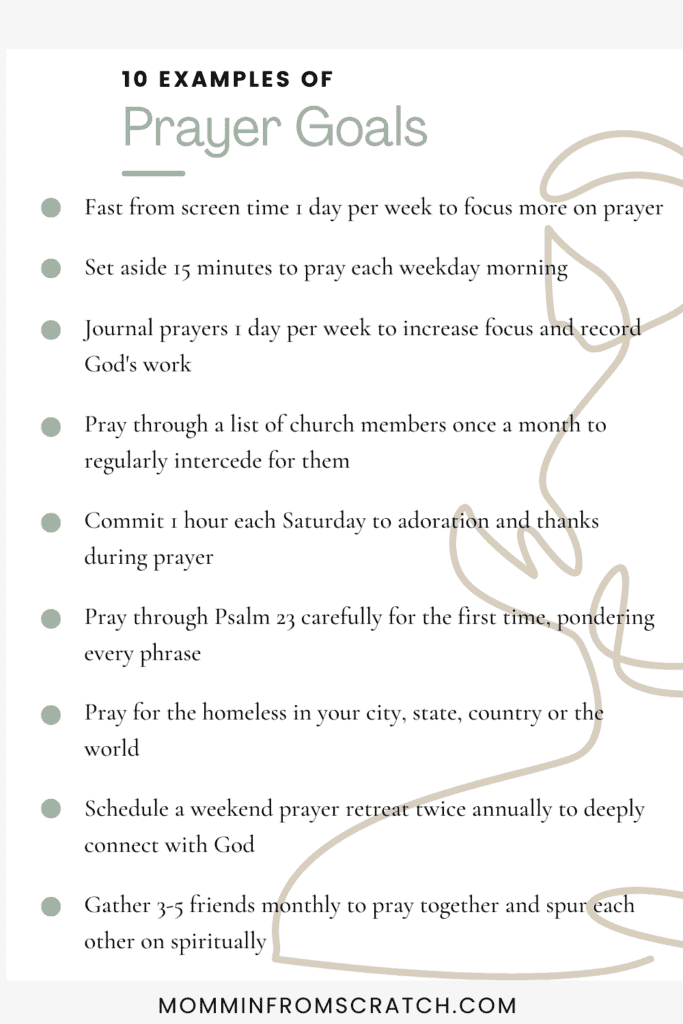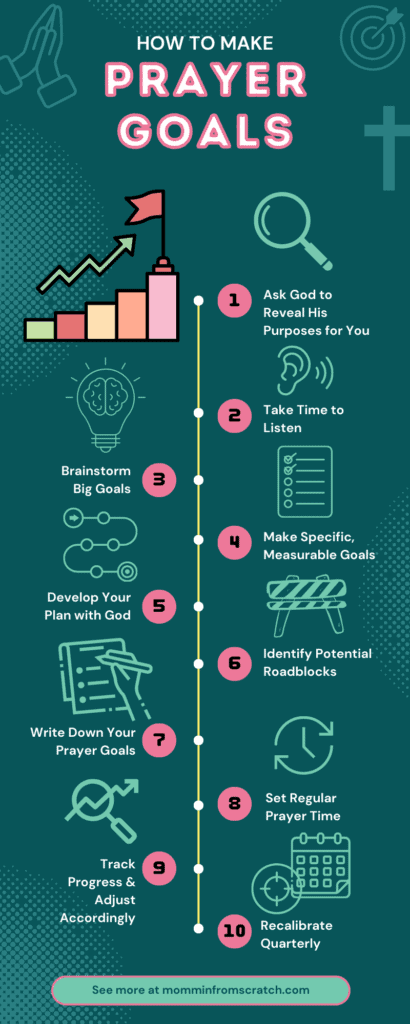5 Powerful Prayer Goals (Step by Step Guide)
Need to create some prayer goals? Here is a step by step guide for Christians to create a goal-setting prayer life.
When I set a goal it motivates me to work hard to complete it. So when my prayer life starts take a back seat in my life, setting prayer goals always gets me back on track.
Taking time to set prayer goals can change your relationship with God. When you get specific about your desires and align them with God’s purpose for your life, powerful things can happen. This step-by-step guide will walk you through the goal-setting process to supercharge your prayer life.
Make sure to pin this to your favorite Pinterest board:

What Is a Prayer Goal?
A prayer goal is the desired growth outcomes you’d like to see in your overall prayer life. You then consistently pray over a period of time for God’s help to achieve these targets.
5 Powerful Prayer Goals
- Praying to have deeper intimacy with God
- Seeking more understanding of God’s Word
- Requesting the ability to hear God’s voice more clearly
- To follow God’s will instead of your heart
- Praying to strengthen your faith in God
Setting intentional prayer goals empowers you to pray with persistence in areas you’d like to grow spiritually. You focus your prayers until you gain ground in developing a closer walk with the Lord. Prayer goals help transform random prayer into strategic prayer around your relationship with God.

Why Setting Prayer Goals Matters
Many Christians struggle to make prayer a consistent habit. Life gets busy, and talking to God can slip down the priority list. Setting prayer goals keeps you focused and gives you time with God intentionality.
Aligning your desires with God’s will also positions you to receive His best. As you seek God’s wisdom and direction for your goals, He can guide you toward prayers that facilitate His work in you.
Finally, setting prayer goals creates accountability. You become more motivated to pray when you make specific commitments. Tracking progress toward your goals keeps you encouraged as you see prayers answered.
In short, dedicated prayer goals help you grow closer to God, align your life with His purposes, and gain strength from seeing His mighty hand at work.
10 Impactful Examples of Prayer Goals
To get your creative juices flowing, here are 10 prayer goal examples to consider:
- Fast from screen time 1 day per week to focus more on prayer
- Set aside 15 minutes to pray each weekday morning
- Journal prayers 1 day per week to increase focus and record God’s work
- Pray through a list of church members once a month to regularly intercede for them
- Pray for a struggling relative by name each morning
- Commit 1 hour each Saturday to adoration and thanks during prayer
- Pray through Psalm 23 carefully for the first time, pondering every phrase
- Pray for the homeless your city, state, country or the world
- Schedule a weekend prayer retreat twice annually to deeply connect with God
- Gather 3-5 friends monthly to pray together and spur each other on spiritually
As you can see, prayer goals can vary greatly in scope and topic. The key is choosing ideas resonate that with your context, passions, and spiritual growth areas.

How to Set Powerful Prayer Goals Step-by-Step
Follow this step-by-step process to set prayer goals that facilitate a deeper connection with God.
1. Ask God to Reveal His Purposes for You
Begin by asking God to make His purposes and desires for your life clear. The
Seek God first, and let your goals flow from your understanding of His plans for you. This alignment positions you for big blessings. As Matthew 6:33 (NIV) says, “But seek first his kingdom and his righteousness, and all these things will be given to you as well.”
2. Take Time to Listen
After asking God to reveal His will, spend time listening for His direction. Sit quietly before Him until you gain clarity.
God may speak through

3. Brainstorm Big Goals
Once you understand God’s general direction for your life, start brainstorming some big goals you’d like to pursue. These will become the categories your prayer goals center around.
For example, God may highlight marriage, parenthood, ministry, career, health, finances, or education as key areas He wants to work in your life. Make a list of the big goal categories you sense Him emphasizing.
|
3.5
|
3.5
|
3.5
|
3.5
|
|
$9.95
|
$9.38
|
$13.49
|
$9.99
|
4. Make Specific, Measurable Goals Under Each Category
Under each big goal category, write down specific, measurable goals you’d like to achieve with God’s help. Define what success looks like and how you’ll know when you’ve accomplished the goal.
For example, for the marriage category, you may set a goal to read one relationship book and go on one date night per month with your spouse. Or for the career category, you could set a target for landing your dream job by a certain date.
Be sure to make your goals are realistic but still require God’s intervention to accomplish them. Prayer goals should be big enough to prompt dependency on Him. And when these big prayers are answered, they will grow your faith.
5. Develop Your Plan with God
Once you’ve defined your specific goals, talk to God about how you should pursue them. Ask Him:
- What actions should I take?
- Who should I consult for wisdom?
- What resources do I need to acquire?
- What habits or mindsets may hold me back?
- How can I stay encouraged when challenges arise?
Ask God to guide your goal achievement plan, then write down the strategy He reveals.

6. Identify Potential Roadblocks
Think through any struggles that might derail your pursuit of each goal. For example, past failures, lack of knowledge, or time constraints could be obstacles. Confess these roadblocks to God and ask Him to help you address them.
Then make practical plans to overcome each barrier. For example, acknowledge that procrastination has delayed past goals, and commit to accountability check-ins around your progress. Doing this work upfront helps pave a smoother road.
7. Write Down Your Prayer Goals
Craft prayer goal statements that summarize what you’re asking God to help you accomplish in each category.
For example: “God, I ask you to help my wife and I read one marriage book per month together, and to schedule one date night per week this year, bringing us closer together and strengthening our relationship.”
Put these prayer goals somewhere you’ll see them often, like on your fridge or by your bedside.

8. Set aside Regular Prayer Time to Focus on Your Goals
Dedicate at least 10-15 minutes daily to pray over your goals. Verbalize your requests, visualize your goals coming to pass, listen for God’s guidance, and read scriptures that apply to your goals. This focused prayer time will keep your goals top of your mind and pursue God’s power to achieve them.
Also, intercede for your goals occasionally throughout the day in short prayers. Keep the dialogue ongoing.
9. Track Progress and Adjust Accordingly
At least monthly, evaluate your progress on each prayer goal. Celebrate any progress through thanksgiving and worship. If you’ve stalled on a goal, ask God to reveal where you need to adjust your approach, and then make those changes. He wants to see you succeed more than you do!
10. Recalibrate Quarterly
Every three months, review your goals with God. Celebrate any you’ve achieved, prayerfully discern if adjustments are needed for others, and ask God if He has any new goals for you to pursue.
Be sensitive to God’s timing and purposes. He may inspire you to modify or abandon goals that no longer align with His plans for each season. Let Him direct your steps.

Frequently Asked Questions
How do I know if my prayer goals align with God’s will? Spend time studying the
What if I don’t achieve my prayer goal by the deadline I set? Remember that timing belongs to God. If you feel you’ve sincerely sought God yet still struggle to achieve a goal, humbly ask Him for discernment. Perhaps He wants you to modify the goal or try a different approach. Or maybe He has purposes for extending the timing that will become clear later. Don’t get discouraged – keep seeking and trusting Him.
Why is it important to track progress on prayer goals? Tracking creates accountability and motivation. You’re more likely to follow through when you know you’ll evaluate your consistency. Tracking also helps you identify what works so you can keep doing it. Making notes about your progress equips you to celebrate victories and make beneficial adjustments where needed.
How do I stay motivated toward my prayer goals over time? Consistently reading your written goals sustains motivation. Share your goals with others and ask them to encourage you. Take one step, no matter how small, daily toward each goal. And continually renew your vision through prayer – ask God to keep your purpose clear and your zeal ignited.










